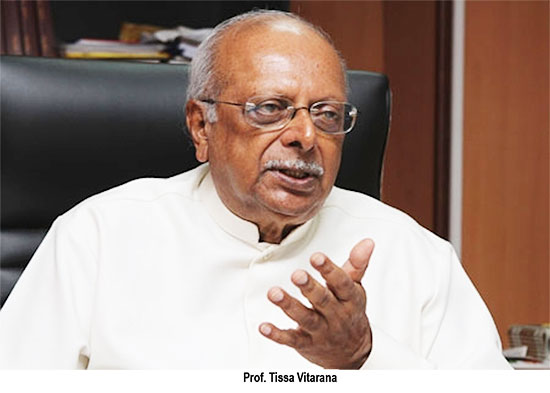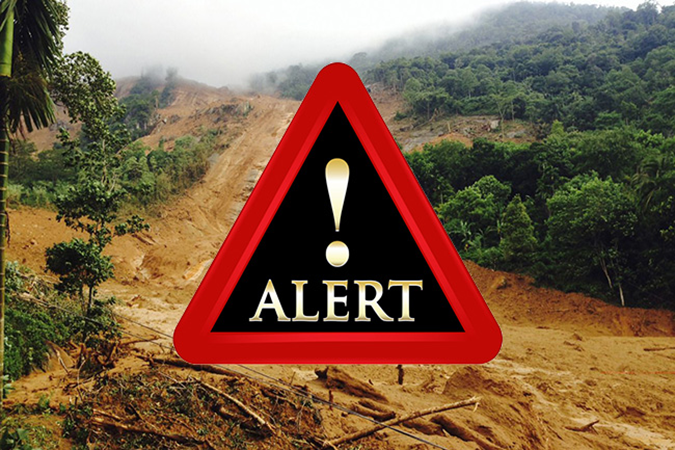News
CORRECT COLLECTIVE ACTION ESSENTIAL TO SAVE SRI LANKA FROM SEVERE CRISIS

by PROF. TISSA VITARANA
Sri Lanka is facing multiple crises, worst of all a severe economic crisis that can end in bankruptcy. But some Government policy makers are acting as if this is just a hiccup that will pass away and needs no properly targeted drastic action.
For some strange reason the people have not been informed of the gravity of the situation and that a period of austerity with belt- tightening by the whole nation is necessary. Nearly all countries, rich and poor, big and small are faced with this situation. So it is nothing to be ashamed off.
In fact the obtaining of the country’s requirement of vaccines, amid severe competition, was an achievement (though I would have been happier if the mRNA vaccines like Pfizer were left out).The Government policy seems to rely almost entirely on the vaccination programme.
It would appear that the expectation is that if nearly everybody is vaccinated the spread of the disease will also end. But this is not the case as those vaccinated can acquire the infection and also transmitted to others. The vaccination only prevents severe disease and death of the vaccinated individual.
Therefore it is essential that the government strictly enforces the observance of the epidemiological health rules (constant wearing of a good mask, the observance of social distancing, the constant washing of hands well with soap and water if anyone touches an object handled by any other person, and the avoidance of crowds by all. This may need the setting up of Covid-19 committees at village level which can acquire the necessary know how and see that the rules are enforced.
A clear plan of action to address this entire situation and which rallies the whole nation is required. The enforcement of the health rules should be given equal or higher priority in the total program.
Since 1977, after nearly 44 years of a neoliberal economy (where the regulation is by market forces which increase imports and the profit of the super-rich, without providing the basic needs of the people) is the main cause of the crisis.
The cost of imports far outstrips the income from exports, leading to a huge foreign trade imbalance. The drop of dollar income from tourism and expatriate labour due to the Covid-19 pandemic has aggravated the situation. The country has been brought into a situation where our foreign reserves are down to less than one billion US dollars (USD), from an earlier average of USD 7 to 8 billion.
This is not enough to buy our needs from abroad for even one month, nor to repay the accumulated loans acquired mainly after 1977 which amounts to about USD 6 billion per year. The internationally recognized Fitch rating has brought their assessment of our economy down to CC (in a scale that extends from AAA to single C).
Thus as we are rated as being close to bankruptcy and no foreign investors can be expected to come here due to the high risk. Therefore we are forced to borrow short term loans at high interest, specially swaps. Sri Lanka is caught in a foreign “debt trap” and is fast running out of USD to buy even essentials like food and medicines from abroad. The lack of dollars will lead to a severe shortage of essentials. The result will be racketeering and high prices – a black market. This will send prices up further.
Within the country the economic situation is extremely bad and specially people in the villages and the urban slums are suffering terribly. Within Sri Lanka 60% of our population is living in poverty. Hunger is widespread and many live on one meal a day. The malnutrition level has gone up to 18.3% (which means that out of five children who are five years of age one is suffering from malnutrition). Not only will the body and mental development of these malnourished children be badly affected, it can have some adverse impact on the entire future generation.
A significant section of the future generation will be mentally deficient, in addition to being short and thin and may behave abnormally. There may be an increase of crime and misbehavior. This trend has already appeared among a significant section of the present younger generation (who have lost their jobs, and become drug addicts as well as part of the underworld).
It is sad to see intelligent and skilled youth queuing up to obtain passports and visas to go abroad, at a time when we need their skills and energy to develop our country. We can ill-afford this brain drain. My fear is that if the economic and social situation deteriorates further, employed professionals too may join this queue.
How do we prevent or minimize these unfortunate trends? The question asked is how long will this Covid-19 pandemic last. On the basis of experience with past pandemics and epidemics, which have generally existed in epidemic form for two or three years, they have then become milder routine infections like the common cold, or influenza. The appearance and increase of herd immunity contributes to the above change. It is my hope that with Covid -19 too this will be the case.
With regard to the repayment of our loans as a country which has been badly hit by the Covid-19 pandemic as well as the global economic crisis we are entitled to re-negotiate and restructure the repayment of our sovereign debt. Accordingly we should ask for a period (say about five years) where we do not re pay our debt to the creditors. This is to enable us to bring about the requisite changes of the policies that will result in sustainable development. During this period we can ensure that our people obtain their essential needs and their suffering be minimized.
The welfare state (free health, free education, allowances to the needy etc.) must not only be properly implemented during this period but also be sustained in the future. Our dependence on loans can be minimized by ensuring that the haves also take a significant part of the burden. The tax rate in Sri Lanka, both personal (14%) and corporate (18%) is one of the lowest in the world. This must be increased to well above the upper limit of tax charged in countries of Europe (35-40%).
Latest News
IMF Executive Board approves US$206 Million in Emergency Financial Support for Sri Lanka

The IMF Executive Board approved emergency financing under the Rapid Financing Instrument (RFI), providing Sri Lanka with immediate access to SDR 150.5 million (about US$206 million,
equivalent to 26 percent of quota) to help Sri Lanka address the urgent needs arising from the catastrophic Cyclone Ditwah and preserve macroeconomic stability.
Latest News
Navy clears major bridge obstructions in Peradeniya and Lewella

In response to severe weather impacts, the Sri Lanka Navy conducted a diving and technical assistance operation on Friday (19 Dec 25) to clear major debris obstructing vital infrastructure.
Heavy rainfall caused a significant rise in the water level of the Mahaweli River, washed large quantities of debris, including logs and bamboo, downstream. These remain lodged in the Diyakapanathota in Gatambe, Peradeniya and Lewella bridges, obstructing the smooth flow of water.
Acting promptly upon request, a Navy diving team executed a coordinated operation in collaboration with the Road Development Authority. The team removed the accumulated debris, restoring normal water flow through the bridges.
Latest News
Landslide early warnings issued to the districts of Badulla, Kandy, Kurunegala, Matale and Nuwara-Eliya extended till 8AM on Sunday (21)

The Landslide Early Warning Centre of the National Building Research Organization (NBRO) has extended the Landslide Early Warning issued to the districts of Badulla, Kandy, Kurunegala, Matale and Nuwara-Eliya till 08:00AM on Sunday (21st December 2025)
The LEVEL III RED landslide early warnings issued to the Divisional Secetaries Divisions and surrounding areas of Medadumbara, Doluwa, Ududumbara and Minipe in the Kandy district, and Nildandahinna, Hanguranketha, Mathurata and
Walapane have been extended.
LEVEL II AMBER landslide early warnings have also been issued to the Divisional Secetaries Divisions and surrounding areas of Soranathota, Hali_Ela, Passara, Meegahakivula, Badulla, Lunugala and Kandeketiya in the Badulla district, Thumpane, Harispattuwa, Udapalatha, Kundasale, Akurana, Poojapitiya, Udunuwara, Pathadumbara, Pasbage Korale, Gangawata Korale, Hatharaliyadda, Yatinuwara, Ganga Ihala Korale, Panvila, Pathahewaheta and Deltota in the Kandy district, Rideegama in the Kurunegala district, Ukuwela, Naula, Matale, Ambanganga Korale, Rattota, Pallepola, Wilgamuwa, Yatawatta and Laggala Pallegama in the Matale district, and Nuwara-Eliya in the Nuwara-Eliya district.
LEVEL I YELLOW landslide early warnings have been issued to the Divisional Secetaries Divisions and surrounding areas of Uva Paranagama, Welimada, Haputhale, Haldummulla, Ella and
Bandarawela in the Badulla district, Alawwa, Mallawapitiya,
Polgahawela and Mawathagama in the Kurunegala district, and Kothmale East, Ambagamuwa Korale, Kothmale West, Thalawakele and Norwood in the Nuwara-Eliya district.
-

 Midweek Review4 days ago
Midweek Review4 days agoHow massive Akuregoda defence complex was built with proceeds from sale of Galle Face land to Shangri-La
-

 Features7 days ago
Features7 days agoWhy Sri Lanka Still Has No Doppler Radar – and Who Should Be Held Accountable
-

 News3 days ago
News3 days agoPakistan hands over 200 tonnes of humanitarian aid to Lanka
-

 News3 days ago
News3 days agoPope fires broadside: ‘The Holy See won’t be a silent bystander to the grave disparities, injustices, and fundamental human rights violations’
-

 Latest News6 days ago
Latest News6 days agoLandslide early warnings in force in the Districts of Badulla, Kandy, Kegalle, Kurunegala, Matale, Nuwara Eliya and Ratnapura
-

 News4 days ago
News4 days agoBurnt elephant dies after delayed rescue; activists demand arrests
-

 Features7 days ago
Features7 days agoSrima Dissanayake runs for president and I get sidelined in the UNP
-

 Editorial7 days ago
Editorial7 days agoDisaster relief and shocking allegations












